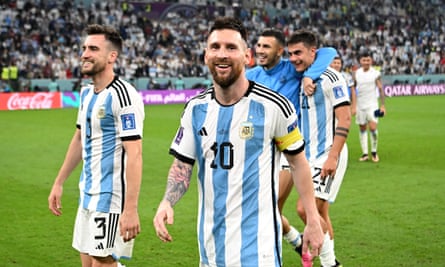Lionel Messi has the farewell he wanted. Or at least the stage for it. On Sunday the striker is known failure internationally – he will play his sixth major final with Argentina. It will be his 26th World Cup match, more than anyone ever, another record collected; it will also be the last.
“To be able to finish my journey at the final makes me happy, and everything I’ve experienced here is lovely,” Messie said at the end of another night, graced by another moment, like a gift given: something to keep when if he will be gone. . It’s four days away now.
four days. One night. Everyone “knew” that this would be Messi’s last World Cup, the feeling of never seeing him clinging to every game again. He knew it too, which is part of why it played out this way: Call it mission, destiny, or just plain fun. Seize the day, there aren’t many left. Yet 16 years after the first of him, as a substitute in That 6-0 victory against Serbia and Montenegro, felt confirmed still scored. Wait what? Will the final be your last? “Yes, it definitely will be,” Messi said on Tuesday evening. “The next one is many years away [World Cup] and I don’t think I will. It’s nice to finish like this.”
Guardian reporting goes far beyond what happens on the pitch. Support our investigative journalism today.
“,”image”:”https://i.guim.co.uk/img/media/48be60e8b3371ffecc4f784e0411526ed9f3f3ba/1700_1199_1330_1331/1330.jpg?width=620&quality=85&auto=format&fit=max&s=8b3ad26c4ab238688c860e907b2cb116″,”credit”:”Photograph: Caspar Benson”,”pillar”:2}”>
Drive fast
Qatar: beyond football
Show

This is a World Cup like no other. For the past 12 years the Guardian has reported on Qatar 2022 issues, from corruption and human rights abuses to the treatment of migrant workers and discriminatory laws. The best of our journalism is gathered on our dedicated Qatar: Beyond the Football homepage for those who want to delve into issues beyond the pitch.
The Guardian’s report goes far beyond what happens on the pitch. Support our investigative journalism today.
So this is goodbye as far as Argentina is concerned. Still, what a way to go. It’s not over yet: the most beautiful game of all awaits you. It’s colossal, of course. But even getting there felt a bit like something had been won, like a realization had been reached. Of Messi and about Messi. You don’t know what you have until it’s (almost) done. Late at the Lusail stadium, an Argentine TV reporter at level 0 chose not to ask her last question. Instead, and you may have seen the clip by now, she used it as a thank-you: “Whatever the outcome, you made people happy,” she said. “You made an impact on everyone’s life.”
Eventually, he too was made happy, with more than a little help from friends old and new. At the end of the Copa América 2016, defeated in the final by Chile, he had left. He hadn’t always felt embraced, his oppressive weight; he said he’s come to feel that everything was his fault. As he was told here: “You had to eat a lot of shit.” Yes, he admitted, but now it’s different. “I’ve been enjoying it so much for a while now, everything that’s going on with us. Being able to finish all this in the final makes me happy.”
This was coach Lionel Scaloni’s doctrine: the sun will rise tomorrow. Messi has embraced that message and the time he has left; it also became his message, and there was a feeling that his teammates were involved not only in Argentina’s success, but also in making him happy, in doing some kind of justice.
“People have understood that this is something we have to enjoy,” said Messi. “We did extraordinary things: the Copa América, 36 games without defeat, a World Cup final. Obviously we all want to win it, but it’s a football match and anything can happen. Hopefully this will be different from Brazil [in 2014, when they lost against Germany]. I don’t know if this is my best World Cup, but I’ve enjoyed it since we got here.”
In Qatar he has five goals and three assists. The stellar moments here are from him. The goal against Mexico and the goal against Australia, both Messi, seen a thousand times if not exactly like this. The absurd assist against Croatia, instant iconography: Josko Gvardiol, the defender everyone was talking about, overturned and overturned, hips snapped, legs tied in a cartoonish knot.
Messi leads the tournament statistics in terms of goals, assists, chances created, dribbles and fouls conceded. That still hasn’t stopped him. He played every minute. He was a Maradonian. He has been Maradona, indeed. And it’s not just about excellence; there is the energy, the expression of commitment, the identification. Sacrifice. Messi held his hamstring for a long time, then he did it That in Gvardiol. It is about the absolute refusal to give up: it was he who declared that this was not done after the defeat of Saudi Arabia. The leadership, getting them through. There may not be a moment of skill like the semi-final, but that doesn’t compare to his goal against Mexico.

There was the flash of anger that preceded the goal against Australia. Clashes against Holland. The edge, the aggression, the shit if you will. The: what are you looking at, stupid? Argentinian fans loved it. Even Messi seems to have it. “It’s always been like this,” Scaloni insists, and in him there is a ferocious, furious competitor, but the fact that the coach had to say so was instructive. They’ve never felt him so close, nor has he felt them this way. This isn’t just a competition, it’s a cause. A rebellion.
“Sometimes it’s an extreme situation, it’s not easy to take the field knowing you have to win and otherwise you go home. We’ve been doing it since the second game. That has a very high mental cost and the group has overcome that,” she said. “We’ve played five ‘finals’ and we have one more.”
It would be wrong to forget how he propelled them to the finals before, but that’s another thing too. She looks different, sounds different, acts different. Not least because it’s a different generation traveling with him, his role changes, some of the weight of the past eased, left behind. Yet there is also a legacy, Scaloni says, in what he leaves them. They, in turn, desperately tried to let him have this last dance.
“What he did in the Copa América was incredible, but I’ve never seen anything like this World Cup in my life,” said goalkeeper Emiliano Martínez. Cristian Romero added: “It’s madness. Everyone knows what he is as a player, but he’s the kind of person he is. He is an example, a boy who always wants more. He’s taken so many hits but he always gets back up.”
A photo has been making the rounds in recent days: in it, an eleven-year-old Julián Álvarez stands alongside his idol, Lionel Messi. Now he has another one after 11 years: teammates this time, Messi holds him in a headlock and smiles after the Manchester City forward scores against Croatia.
“The things Leo can do are amazing,” he said, and he had seen it firsthand, about to finish off an impossible assist, the best in the competition. Except maybe what Messi gave to Nahuel Molina in the previous round.
Messi had provided that pass and the tackle pass that released Álvarez, running and grouping, to score the second. Meanwhile it was Enzo Fernández who delivered the ball which led to Messi scoring the opener, from the penalty spot. And he, too, had grown up watching the man who put Argentina ahead, who grabbed them and carried them to a second World Cup final, just like Maradona.
In 2016, when Messi was considering leaving, Fernández posted a message on Facebook which he signed apologizing and thanking him. He said, “How can we, a bunch of nobody who don’t live with 1% of the pressure you do, 40 million people who make ridiculous demands for perfection when we don’t even know you, are going to try to convince you? Do what you want but think about staying and having fun.
Now it finally is, the time of his life and theirs that brings us all to a final goodbye.